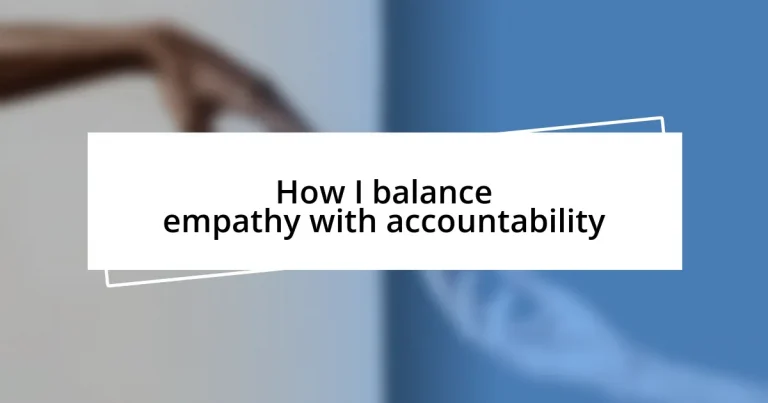Key takeaways:
- Empathy involves emotional investment in others’ experiences while maintaining a focus on encouraging positive actions and accountability.
- In the workplace, accountability entails ownership of one’s actions, contributing to team success through a supportive culture and clear expectations.
- Addressing accountability challenges requires open dialogue, setting clear goals, and framing mistakes as learning opportunities to foster growth.
- Modeling vulnerability and encouraging shared experiences can strengthen team trust, making accountability a collaborative journey rather than a burden.
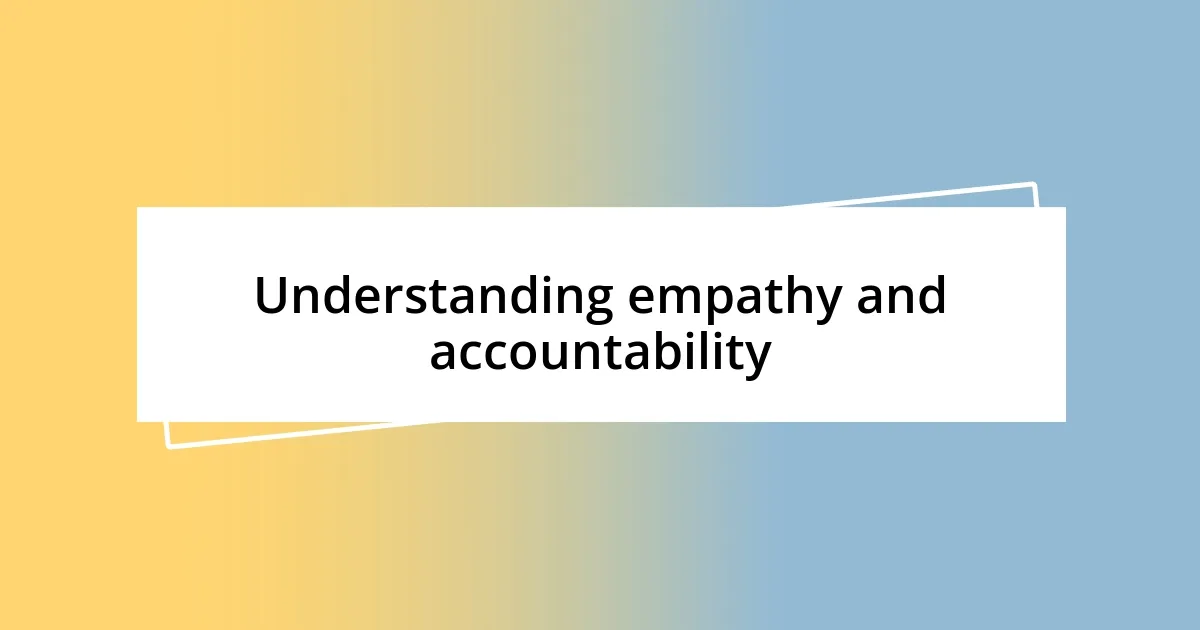
Understanding empathy and accountability
Empathy is the ability to understand and share the feelings of others, but it goes beyond mere sympathy; it requires an emotional investment in someone else’s experience. I remember a time when a friend was going through a tough breakup, and while I felt their pain, I realized my role wasn’t just to nod sympathetically but to support them in a way that acknowledged their feelings without ignoring the importance of moving forward. How often do we find ourselves caught up in someone’s emotions to the point where we forget to encourage positive actions?
On the flip side, accountability is about taking responsibility for our actions and the impact they have on others. I once managed a team project where one member consistently missed deadlines. Initially, I felt empathy for their struggles at home, but it soon became evident that holding them accountable was necessary for the team’s success. Balancing empathy with accountability requires us to ask: how can I support someone while also ensuring they understand the importance of their commitments?
The intersection of empathy and accountability can feel tricky. It’s about recognizing that showing understanding doesn’t mean neglecting responsibility. There was a moment when a colleague made a mistake that affected our entire schedule, and I could see they were devastated. Instead of reprimanding them harshly, I chose to discuss how we could rectify the situation together while still emphasizing the importance of their role. Isn’t it fascinating how empathy can actually foster a stronger sense of accountability in ourselves and others?
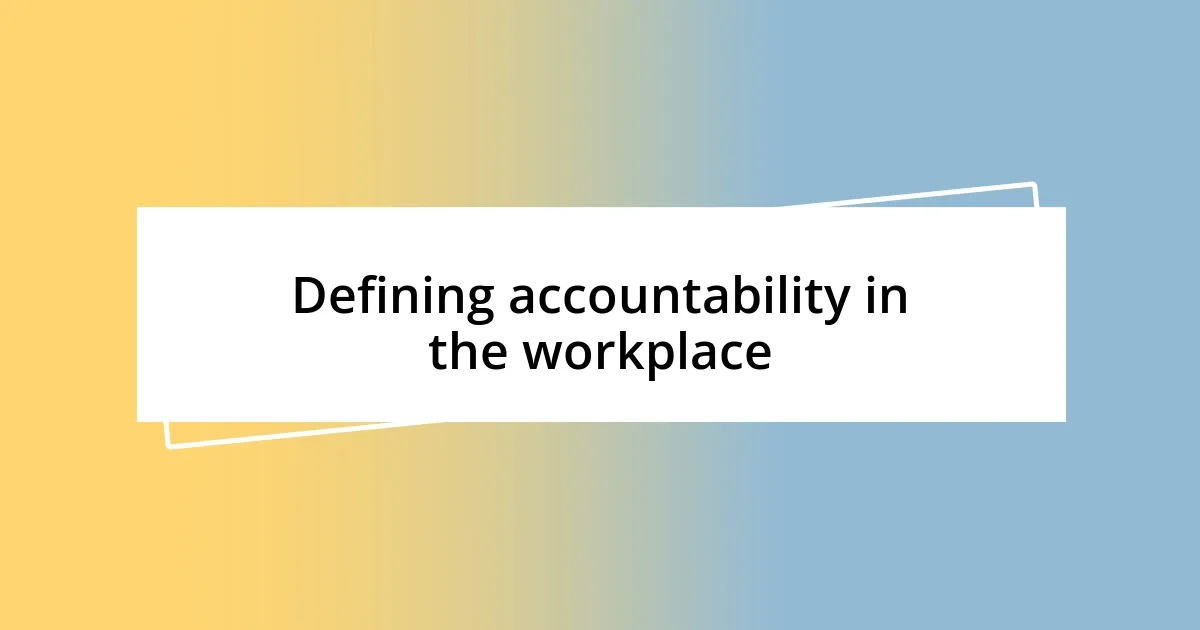
Defining accountability in the workplace
Accountability in the workplace is fundamentally about ownership. It’s about employees understanding that their actions, decisions, and behaviors directly influence the team’s success. I recall a situation where a colleague openly admitted to missing a target, feeling the weight of disappointment. Instead of focusing solely on the mistake, we discussed what they could learn from it. This allowed them to acknowledge their responsibility and fostered a genuine commitment to improvement.
Moreover, accountability isn’t just about individual actions; it also involves creating a culture where teams support one another. In my experience, when I’ve been part of teams that regularly held each other accountable, the workplace atmosphere transformed. There was a sense of trust, and team members felt safe voicing challenges without fear of judgment. This collective responsibility enabled us to tackle tasks more efficiently and creatively, ultimately leading to enhanced productivity.
To make accountability clear, it helps to set defined expectations and provide constructive feedback consistently. I once worked under a manager who emphasized accountability through regular check-ins and open dialogue. It was enlightening to see how her approach empowered us to take ownership of our work and effectively communicate any hurdles we faced. This practice not only kept us aligned with our goals but also reinforced our commitment to one another’s success.
| Aspect | Accountability |
|---|---|
| Definition | Ownership of actions and their impact on team success |
| Culture | Fostering trust and support among team members |
| Expectation | Clear goals and regular feedback are essential |
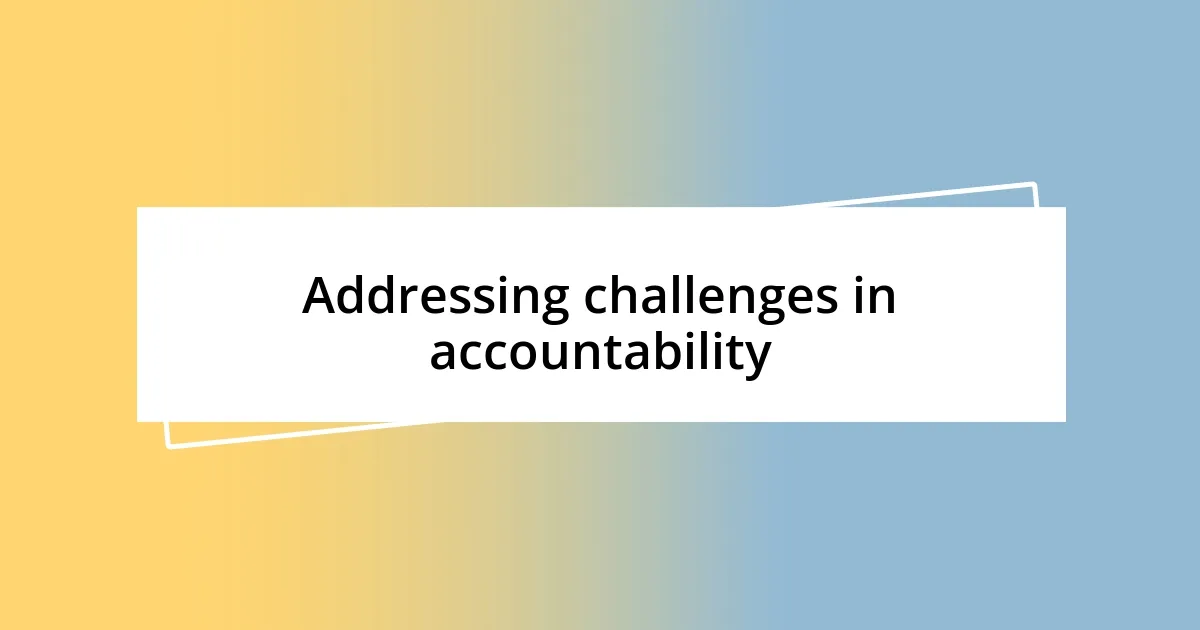
Addressing challenges in accountability
Addressing challenges in accountability requires recognizing that it often stirs a mix of emotions, both for the leader and the team member involved. I remember a project where one of my teammates consistently underperformed. It was tough because I could see how overwhelmed they were, but it left the rest of us carrying the weight. I found myself standing at a crossroads: How do I address their lack of accountability while remaining supportive of their struggles? This is the delicate balance we must navigate.
Here are some strategies I’ve found helpful:
- Foster open dialogue: Create a space where team members feel safe discussing challenges without fear of repercussions.
- Set clear expectations: Establish measurable goals so everyone understands what accountability looks like.
- Emphasize learning opportunities: Frame mistakes as chances for growth, encouraging a mindset that values improvement over blame.
- Lead by example: Demonstrate accountability in my actions, inspiring others through my own commitment to responsibility.
- Balance empathy with firmness: Validate emotions while clearly communicating the consequences of inaction, so everyone understands both the care and the seriousness of accountability.
In situations where accountability might lead to tension, I’ve learned to approach the conversation with curiosity rather than judgment. Instead of jumping to conclusions, I asked questions that revealed underlying issues. This way, I could address the root cause of the behavior while still holding my teammate accountable. It’s about striking that balance—showing understanding while still emphasizing the importance of responsibility.
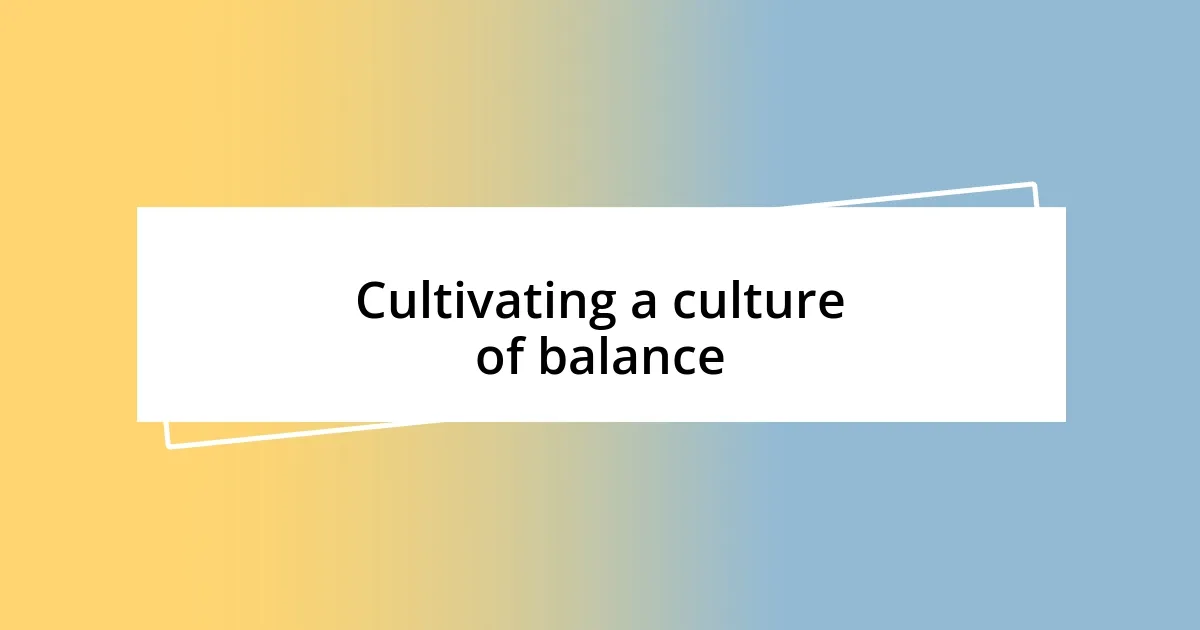
Cultivating a culture of balance
Cultivating a culture of balance is essential for fostering an environment where both empathy and accountability thrive. I vividly remember a team I was part of where we regularly met to reflect on our progress. One meeting stood out because we didn’t just discuss metrics; we also shared our personal challenges. It was eye-opening to see how understanding each other’s struggles created a deeper trust among us, making accountability feel less like a burden and more like a shared journey.
To truly cultivate this balance, it’s crucial to model vulnerability. I once had a manager who openly admitted when they made mistakes. This not only humanized them but also encouraged me to share my own failures without fear. Have you ever felt that relief when someone in a position of authority shares their slip-ups? It creates a liberating space for growth—you start to see mistakes as part of a collective learning process rather than something to hide from.
Empathy can act as a powerful catalyst for accountability. When team members feel supported, they’re more likely to own their actions. I recall an instance where I led a project that didn’t meet expectations. Instead of casting blame, my team and I gathered for a candid discussion. We examined what went wrong while also supporting one another emotionally. It was remarkable how this open dialogue not only strengthened our bonds but also motivated us to improve for the future. In essence, when accountability is paired with genuine understanding, it transforms into a commitment to collective success.












